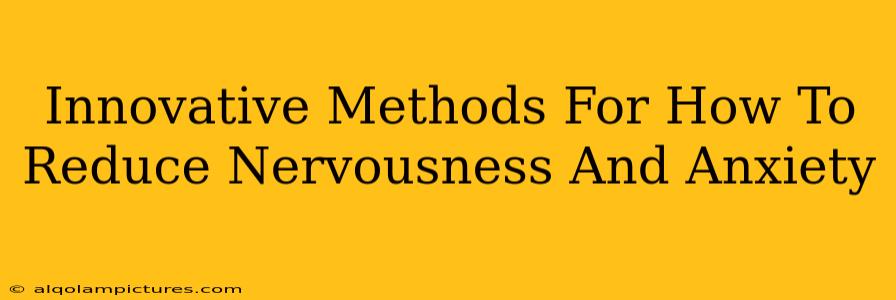Feeling nervous or anxious is a common human experience. We all face moments that trigger these feelings, whether it's a big presentation, a first date, or a challenging life event. While mild anxiety can be a motivator, overwhelming nervousness can significantly impact your daily life. This post explores innovative methods to help you manage and reduce nervousness and anxiety, moving beyond the usual advice and into practical, effective strategies.
Understanding Your Anxiety Triggers
Before diving into solutions, it's crucial to understand what triggers your anxiety. Keeping a journal can be incredibly helpful. Note down situations that make you feel anxious, the physical sensations you experience (e.g., rapid heartbeat, sweating), and your emotional responses. This self-awareness is the first step towards effective management.
Identifying Patterns: The Key to Proactive Anxiety Management
Once you've identified patterns in your journal, you can start to predict and prepare for anxiety-provoking situations. For example, if public speaking consistently triggers your anxiety, you can proactively work on strategies to manage it, such as practicing your speech multiple times or using visualization techniques.
Innovative Techniques to Calm Your Nerves
Now, let's explore some innovative methods to reduce nervousness and anxiety:
1. Harness the Power of Mindfulness Meditation: Beyond the Basics
Mindfulness meditation isn't just about sitting quietly; it's about focusing on the present moment without judgment. Innovative applications include incorporating mindful movement like yoga or Tai Chi, or using guided meditations specifically designed for anxiety reduction. These methods engage your body and mind simultaneously, leading to a more profound calming effect.
2. Embrace Nature's Calming Effects: Ecotherapy
Spending time in nature has been scientifically proven to reduce stress hormones. Innovative approaches include forest bathing (Shinrin-yoku), where you immerse yourself in the sights, sounds, and smells of a forest, or simply taking a mindful walk in a park, paying close attention to your surroundings. This helps shift your focus away from anxious thoughts.
3. The Art of Self-Compassion: Reframing Negative Self-Talk
Negative self-talk fuels anxiety. Innovative ways to counter this involve practicing self-compassion, treating yourself with the same kindness and understanding you would offer a friend. This includes acknowledging your struggles without judgment and focusing on your strengths and accomplishments.
4. Technological Solutions: Apps and Wearables
Technology offers exciting tools for anxiety management. Innovative apps use techniques like biofeedback, providing real-time data on your heart rate and breathing to help you regulate your physiological responses. Some wearables even offer guided meditations and personalized anxiety-reducing exercises.
5. Creative Expression as a Therapeutic Outlet: Unleash Your Inner Artist
Creative expression, whether it's painting, writing, playing music, or dancing, can be a powerful tool for processing emotions and reducing anxiety. Innovative approaches include joining a creative writing group or taking an art class, connecting with others who share your passion and providing a supportive environment for self-expression.
Boosting Your Resilience: Long-Term Strategies
Managing anxiety is an ongoing process. Building resilience is key to coping with future challenges.
Prioritize Sleep Hygiene: The Foundation of Mental Well-being
Sufficient sleep is crucial for regulating mood and reducing stress. Establish a regular sleep schedule, create a relaxing bedtime routine, and ensure your sleep environment is conducive to restful sleep.
Nourish Your Body and Mind: The Importance of a Healthy Lifestyle
A healthy diet, regular exercise, and mindful hydration support both physical and mental well-being. Focus on nutrient-rich foods, find physical activities you enjoy, and stay consistently hydrated.
Conclusion: Your Journey to Calm
Reducing nervousness and anxiety is a personal journey. Experiment with these innovative methods, find what works best for you, and remember that seeking professional help is a sign of strength, not weakness. By understanding your triggers, embracing innovative techniques, and building resilience, you can take control of your anxiety and live a more fulfilling life.

